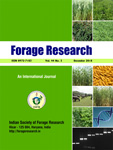RAJ KUMAR, UMA DEVI, PREETAM KUMAR, CHARAN SINGH, SATPAL, SATENDER KUMAR* AND DALVINDER PAL SINGH
Department of Agronomy, 2Department of Soil Science,
Forage Section, Department of Genetics & Plant Breeding
CCS Haryana Agricultural University, Hisar-125004 (Haryana), India
*(e-mail : satender2144@hau.ac.in)
(Received : 2 March 2022; Accepted : 22 March 2022)
SUMMARY
Maize (Zea mays L.), due to its higher yield potential among other members of Poaceae family; known as “queen of cereals”. Maize is India’s third most important crop after rice and wheat. Following India’s green revolution, intensive agriculture practices have resulted in a variety of issues, including environmental pollution, decline in soil fertility, productivity and organic matter content. Adding organic source of nutrients is critical for plant and field growth, yield and quality as they are good source of both macro and micro nutrients in available form to the plants; in addition, it improves soil health, microbial count and water holding capacity of soil. In this review, most of research findings reviewed indicates that organic manure application improved sustainable productivity, nutrient content and soil nutrient status. Use of treated sewage water has been found promising in replacing the conventional irrigation water. Keeping these points in view, the literature pertaining to organic manure and treated sewage water use in maize and other crop to obtain higher production and good quality has been reviewed.
Key words: Maize, sewage water, organic manure, quality, production and fertility

